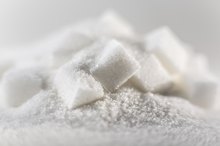What Neutralizes Sugar?
The United States Department of Agriculture (USDA) recommends that you consume no more than 10 teaspoons of sugar per day. Nevertheless, with the accessibility of sugar-filled drinks and snacks, the average person consumes approximately 30 teaspoons of sugar per day. The body, which is meant to maintains a balance between acidity and alkalinity, becomes out of balance and overly acidic when we consume too much sugar. It is important to understand how the body neutralizes sugar in order to recognize the harmful effects of this addictive substance.
Basics
Sugar upsets the natural balance, making the blood, urine and tissues of the body more acidic. The balance between acidity and alkalinity is also known as pH. The body typically maintains a natural pH around 7.3, with the saliva and urine being between 6.8 and 7.0. When we consume too much sugar, the pH of the body becomes more acidic, causing the urine and saliva to linger around 5.5 to 6.5. Neutralizing this acidity is important since an acidic body is prone to illness and disease.
- Sugar upsets the natural balance, making the blood, urine and tissues of the body more acidic.
- When we consume too much sugar, the pH of the body becomes more acidic, causing the urine and saliva to linger around 5.5 to 6.5.
Alkaline Substances
Symptoms of a Sugar Allergy
Learn More
The body utilizes alkaline substances in order to restore the pH of the body and neutralize the harmful effects of sugar. Alkaline substances neutralize the acidity caused by sugar in the blood, saliva and urine. For this reason, your diet should be 80 percent alkaline and 20 percent acidic 3. If you suffer from illness or disease, you should aim to maintain a diet that is 100 percent alkaline. Without alkaline substances, your body would not be able to neutralize the effects of sugar.
- The body utilizes alkaline substances in order to restore the pH of the body and neutralize the harmful effects of sugar.
- For this reason, your diet should be 80 percent alkaline and 20 percent acidic 3.
Minerals
Minerals such as calcium, magnesium, and potassium are alkaline substances that neutralize and aid the body in metabolizing sugar. The richest source of calcium within our bodies is our bones. Therefore, consuming large quantities of sugar causes the body to rob our bones of calcium in order to neutralize the acidity. The end result is calcium depletion, leading to brittle, porous bones and the danger of osteoporosis. Taking mineral supplements with calcium, potassium, magnesium and iron will help to neutralize sugars in the body and ensure that your body does not have to steal calcium from your bones. The best thing you can do, though, is avoid consuming too much sugar.
- Minerals such as calcium, magnesium, and potassium are alkaline substances that neutralize and aid the body in metabolizing sugar.
Water
Gatorade G2 Ingredients
Learn More
Water, an alkaline substance, is best for neutralizing the effects of sugar on your dental health 2. Sugar consumption plays a big role in tooth decay 1. Even if you don’t eat candy, sugary sodas, fruit juices and sports drinks can coat the teeth and cause the saliva to be more acidic. Water neutralizes sugar by reducing the acidity of the saliva and washing the sugar from your teeth as it is consumed throughout the day.
Related Articles
References
- The Analyst: Excess Sugar Consumption
- Evolving Wellness; Health Effects of Sugar on Your Body; Evita Ochel; November 2010
- CTDS; Alkaline and Acidic Food List; 2011
- The Telegraph, "Cleanse your body with the alkaline diet." Dec. 29, 2014
- Han H, Segal AM, Seifter JL, Dwyer JT. Nutritional Management of Kidney Stones (Nephrolithiasis). Clin Nutr Res. 2015;4(3):137-52. DOI: 10.7762/cnr.2015.4.3.137
- Schwalfenberg GK. The alkaline diet: is there evidence that an alkaline pH diet benefits health?. J Environ Public Health. 2012;2012:727630. DOI:10.1155/2012/727630
- Remer, T et al. Potential Renal Acid Load of Foods and its Influence on Urine pH, Journal of the American Dietetic Association, Volume 95, Issue 7, 791 - 797 DOI:10.1016/S0002-8223(95)00219-7
- Dawson-Hughes B, Harris SS, Ceglia L. Alkaline diets favor lean tissue mass in older adults. Am J Clin Nutr. 2008;87(3):662-5. doi: 10.1093/ajcn/87.3.662
- Fagherazzi G, Vilier A, Bonnet F, et al. Dietary acid load and risk of type 2 diabetes: the E3N-EPIC cohort study. Diabetologia. 2014;57(2):313-20. doi:10.1007/s00125-013-3100-0
- Xu H, Åkesson A, Orsini N, Håkansson N, Wolk A, Carrero JJ. Modest U-Shaped Association between Dietary Acid Load and Risk of All-Cause and Cardiovascular Mortality in Adults. J Nutr. 2016;146(8):1580-5. doi:10.3945/jn.116.231019
- Han E, Kim G, Hong N, et al. Association between dietary acid load and the risk of cardiovascular disease: nationwide surveys (KNHANES 2008-2011). Cardiovasc Diabetol. 2016;15(1):122. doi:10.1186/s12933-016-0436-z
- Jia T, Byberg L, Lindholm B, et al. Dietary acid load, kidney function, osteoporosis, and risk of fractures in elderly men and women. Osteoporos Int. 2015;26(2):563-70. doi:10.1007/s00198-014-2888-x
- Rebholz CM, Coresh J, Grams ME, et al. Dietary Acid Load and Incident Chronic Kidney Disease: Results from the ARIC Study. Am J Nephrol. 2015;42(6):427-35. doi:10.1159/000443746









